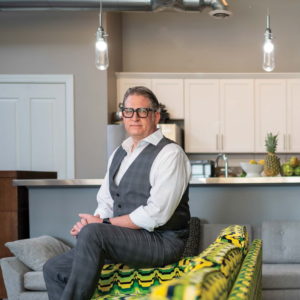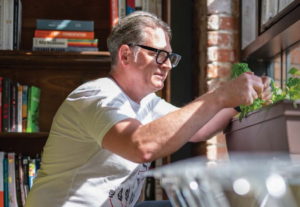 |
Get Full article here. |
Q How did you gravitate into turnaround/restructuring work?
BOGUCKI I started working in restaurants when I was 15, washing dishes. I did the typical climb through the ranks. I was working full time in kitchens, 40-plus hours a week, when I was a junior and senior in high school. I’d get out of school and go to work at 4 and get out around midnight, one o’clock. I’d go back and do it again the next day after school.
I stuck with it as a career. It was something that I enjoyed passionately. You know there must be a passion involved, just because of the hours and the pay. I still think there was a quality of life there; it’s just a different one than what most people would consider to be a quality of life. It was a fantastic professional experience. It appealed to me creatively. Everything about it, I loved.
I worked my way up through the ranks at a young age, finding myself an executive chef in my early 20s and gaining recognition. The compliments I received from my peers were certainly rewarding. I had the opportunity to meet a lot of great people from a lot of different walks of life, and I met a lot of great chefs—Anthony Bourdain, Eric Ripert. Charlie Trotter was another chef I had a good relationship with.
I stuck with that until about 2000. It was a combination of a lot of things that were happening in the culinary world generally and to me personally and professionally that led me to decide it was time for a change. It was right around the dawn of the celebrity chef. There was a move to have chefs do more than just cooking. I certainly had a business sense at that time, having vested interests in restaurants and a stake in the success of what we were doing. But to be out there promoting it at that level didn’t appeal to me. That wasn’t what I was passionate about.
And there were issues revolving around quality of life. The hours were crazy. I would work 100 hours a week for four weeks straight to open a new restaurant, and I would love every minute of it. I’d make everything from scratch. I’d end the night by putting on the stock pot at 1 a.m. I’d go out and sleep on the banquette for three hours and get up in time for the morning produce delivery and to get the prep set up for the day. I thoroughly loved it. A big part of my heart still lies in that industry.
But I decided it was time for a change. I was born and raised in Buffalo. I worked my way down the Eastern Seaboard and worked in restaurants in Miami and Puerto Rico, and as I started to work my way back north again, I found myself in Atlanta. I
I discovered that Georgia State University had one of the preeminent philosophy departments in the country. I’d always been interested in reading, writing, philosophy, and English. Honestly, to me going back to school was almost like taking a vacation. I enjoyed studying—the reading, writing, the rigor of academia. I decided to really load up my coursework and did two bachelor’s degrees and a master’s in three years.

I wanted to practice law in New York. I loved the city whenever I visited, the whole vibe. I got into St. John’s School of Law and started my studies there. I took a class on creditors’ rights from Ray Warner, who was the founding dean of the school’s Bankruptcy Studies and created its LL.M. program. There were a lot of people who took a class from him and just decided immediately they wanted to get into the bankruptcy world. He inspired me to pursue bankruptcy work.
I knew attorneys who ate in my restaurants, and I had friends who went to law school. I’d talk to them about how they happened into certain areas of the law. A lot of what I heard from these people was, you get hired by a firm and you get the first file that they need someone to work. An attorney I knew at the time was in sports law, representing sports unions and entities like that. When I asked him how he came into that area of law, he said it was that first file that got tossed on his desk. After working that file for six months, he became the firm’s expert on sports law. Next thing you know, that’s what he spent his 40- to 45- year career doing. He loved what he did, but it was really happenstance and coincidence that led him to it.
But being a second-career law student, I did not want to find myself doing something I didn’t enjoy. Enjoying what I did for work was something I learned in kitchens. I’m one of the lucky few people who knows what it means to really enjoy and be passionate about what you do. As I was becoming enchanted with bankruptcy law, I decided that that’s what I wanted to pursue.
As a second-career law student, frankly I needed something to help me market myself. I wanted to have that additional degree, the master’s in bankruptcy, to put out there when I went looking for work. As I pursued the master’s, I took law school classes that weren’t your typical law school classes. They weren’t mired in theory and some of the other pitfalls that go along with studying the law.
I got even more of that in the LL.M. program. My professors were practitioners and judges. I took a negotiation class with former Bankruptcy Judge Robert Drain of the Southern District of New York, who handed down

decisions in the Purdue Pharma case. My mentor, who I still stay in contact with, was Melanie Cyganowski, the former chief bankruptcy judge in the Eastern District of New York.
The professors who taught the classes really showed you what it looked like when the rubber hit the road. Those classes were no joke. I think my Chapter 11 reorganization class alone, by the end of the semester, produced 10 to 12 six-inch, three-ring binders worth of material. It was an intense indoctrination, but it further reaffirmed for me that I enjoyed this line of work.
I used a little bit of hustle from my former career to get into the first firm I worked with. Because they had a little bit of a shift in their partner structure—part of their group left and went to another firm—I hustled into my role there while I was still finishing my studies. I was working full time at a boutique bankruptcy law firm in my last semester in law school. I was already up and running and on the track, but it was a long and winding journey to get there.
Q What have been some of your most gratifying or favorite cases along the way?
BOGUCKI One of my fondest memories was working on the Bernie Madoff case. I worked at BakerHostetler, where Irving Picard, the trustee who was charged with recovering the funds Mr. Madoff took and squandered, also worked. He was charged with clawing funds back to the bankruptcy estate for distribution to creditors. A couple of friends at the firm reached out to me and told me about all the exciting things they were up to in that group. This was during the formative stages of the case, right after Madoff turned himself in and Irving Picard was appointed.
To get a well-rounded practice base and experience, I joined that group, and it was immensely fulfilling. The resources that we had at our disposal to do research, discovery, and motion practice were amazing, as was the fact that we were making law as we went along. It was fast paced. There were a lot of us working cases. There was a lot of camaraderie and great team efforts by everybody involved. It was an amazingly rewarding experience. I don’t think many people get the opportunity to really dig into a case for two or three years. That experience was one of the highlights of my career.

Q You all were highly successful, too. It must have been fascinating— you had detective work, legal work, and a little bit of everything going on.
BOGUCKI Yes, and it was international in scope, so there were issues like trying to figure out how to effectuate legal service in some small town in Germany. The most esoteric things came our way. A district judge overruled himself on a particular specific area of law after the research I did.
No stone was left unturned. There was no legal theory that wasn’t explored to its fullest extent. The job that we did there could not have been more complete. There was no way anyone could walk away from that saying that we didn’t work as hard as we could to recover those funds on behalf of Bernie’s customers.
Q Any other engagements come to mind?
BOGUCKI It wouldn’t really be a particular engagement. Since moving back to Buffalo for family reasons and working in a smaller shop, I’m having a completely different experience than I had in New York. I’m able to work with more small-business owners and help them get through troubled times, taking a more holistic approach.
I’m able to work with individuals and their businesses, having had the practical experience I did as a chef and a restauranteur, and help them clean up their balance sheet and work with them to creatively develop promotion and product development and to cut costs. And, of course, they bring you in as a lawyer is to take care of the legal work.
To really be able to work with people in a more holistic approach where there is the opportunity to really turn around small businesses, understanding that there are families involved and there are local communities involved—all the things that you don’t always pick up in the headlines. To have that opportunity to help rehabilitate businesses on more of a micro level, I couldn’t be more thankful or appreciative to the people who come to me for help to be given that opportunity.
Q What key milestones in your career have helped make you the professional you are today?
BOGUCKI I remember one of my first days in law school riding the elevator with somebody. They asked me what I’d done previously, and I told them about my restaurant experience. As only a lawyer or a lawyer-to-be could do, they said, “How do you plan on using that in the practice of law?”
I didn’t understand it at that point, but honestly, the experience I had working in kitchens—working with diverse groups of people, working under stress, being able to multitask, and dealing with the intensity of that environment—has certainly helped me. I truly believe being able to deal with pressures, multitasking, prioritizing, and handling a diverse case load helped me to be as successful as I am.

Q What role has your TMA membership played in your career?
BOGUCKI When I was practicing in New York, it was ingrained in me to network. They start to teach that in school, at St. John’s. When I started to practice at my first firm, they were not just encouraging, but they almost insisted on us participating in organizations like TMA.
It’s helped me, particularly after my relocation, by making it feel more like home. I participated in TMA in New York, and when I moved back to Buffalo, I sought out the Upstate New York Chapter. I’ve met a lot of great people and have rounded out my knowledge, experience, and what I’m able to offer clients by knowing what a forensic accountant does, knowing how an auctioneer works, knowing how different attorneys fit their roles, and how chief restructuring officers operate.
To be able to have those one-on-one conversations with folks like that and learn how every component of the industry works has opened my mind to more creativity solve the problems my clients bring to me. If a client needs my services, I can sit there and think about how all these professionals that I now know from TMA can fit into that puzzle.
Q What advice would you have for someone who was new to the industry or was thinking about getting into it?
BOGUCKI From a lawyer’s standpoint, I think there would be a fundamental base knowledge they should try to acquire in law school. I’m thinking about interns that have worked for me. I’d push them toward secured transactions, creditors’ rights, and Chapter 11 to develop an understanding that you’re looking at more than just an area of law. To be able to approach cases with a broader perspective on how you can help people is important.
There’s also the downside to it, too. When I took my Chapter 11 restructuring class as part of the master’s program, on the first day of the class one of the practitioners said, “You will experience people committing suicide.” It’s not an easy line of work. You can’t just take a clinical approach to what you do. You need to understand that people’s livelihoods are at stake, along with the reasons why a company went into bankruptcy or needs to be rehabilitated. There are a lot of things that you come across that you have to steel yourself against. The work that I’m doing in the Buffalo Diocese case certainly brings that to mind. You’re helping people who went through some of the most atrocious set of circumstances you can imagine anybody surviving.
There’s a very real human component to what goes on. Many times, you’d like to look at it as a problem they’ve gotten themselves into that they need to get out of, but the story is always much bigger than that. You need to have a level of empathy and understanding to be able to see the bigger picture.
Q What are you passionate about these days outside the office?
BOGUCKI I’m a dad, which is probably the greatest accomplishment of my life. I have a beautiful 17-year-old daughter who I couldn’t be prouder of. She’s doing great in school and is looking at starting college in another year.
I’ve gotten to that point in my career where I’m poised to focus on family and things like that. I love to cook, obviously. I love music. I play guitar and played in a hard-core punk band when I was in my early 20s, so I have that on my resume as well. I love music, the arts, food, eating— all of that. I think it’s important to have those passions outside of work to help balance out some of those things we talked about earlier.

